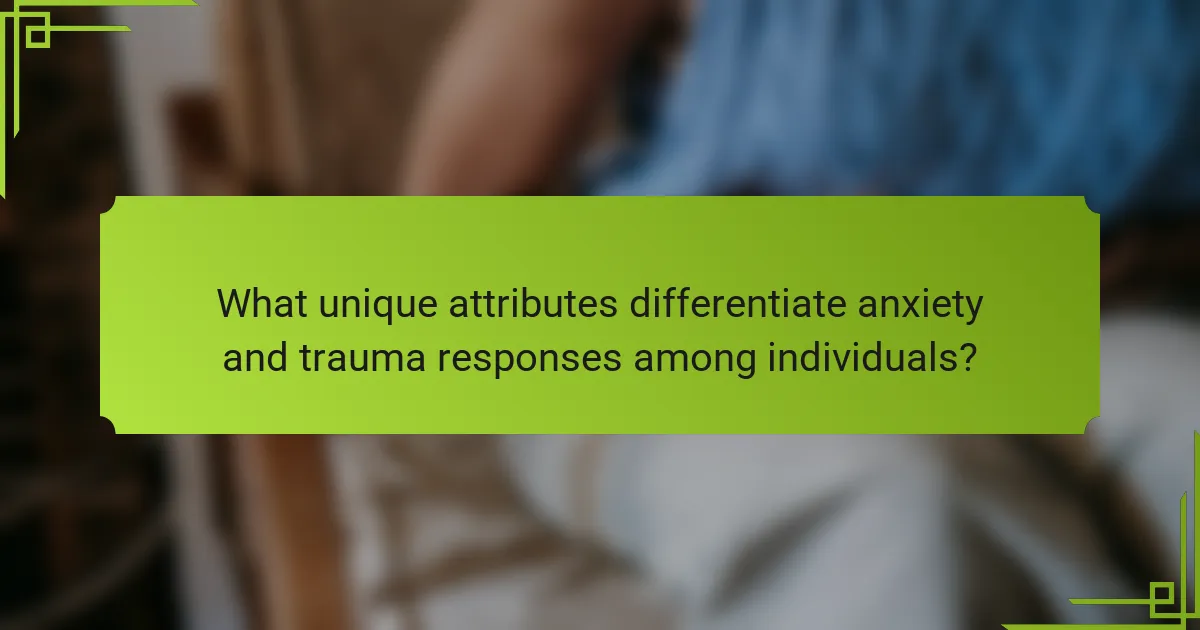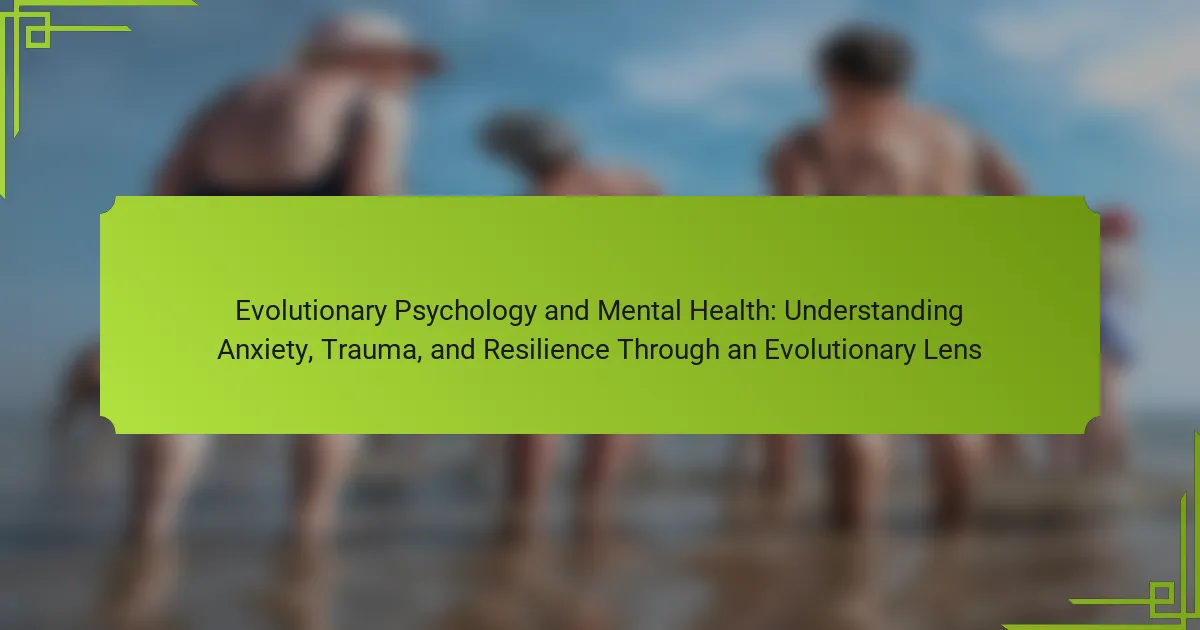Understanding anxiety and trauma through the lens of evolutionary psychology reveals their roles as adaptive responses to threats. This article explores how these mental health issues enhance survival, the significance of resilience, and the unique attributes influencing individual responses. It also examines cultural factors shaping perceptions and coping strategies, highlighting the importance of tailored interventions for improved mental health outcomes.

How does evolutionary psychology explain mental health issues like anxiety and trauma?
Evolutionary psychology suggests that anxiety and trauma are adaptive responses shaped by natural selection. These mental health issues may have evolved as mechanisms to enhance survival by promoting caution and awareness in potentially dangerous environments.
Anxiety can signal threats, prompting individuals to avoid risk, while trauma responses may help individuals learn from adverse experiences to prevent future harm. This perspective emphasizes resilience as a vital attribute, showcasing how these responses, though distressing, can ultimately enhance survival and adaptation.
Research indicates that these psychological traits are not simply disorders but part of a broader evolutionary framework that prioritises human survival. Understanding this context can inform therapeutic approaches that focus on resilience and adaptive coping strategies.
What are the evolutionary roots of anxiety and its adaptive functions?
Anxiety has evolutionary roots as a survival mechanism that enhances awareness of threats. This adaptive function promotes quick responses to danger, increasing the chances of survival. Anxiety triggers fight-or-flight responses, enabling individuals to react swiftly in perilous situations. Furthermore, social anxiety fosters group cohesion by encouraging caution around potential threats, thus enhancing community safety. Understanding these evolutionary aspects reveals how anxiety can be both a challenge and a vital component of human resilience.
How do ancestral environments shape modern trauma responses?
Ancestral environments significantly influence modern trauma responses by shaping adaptive mechanisms. These mechanisms evolved to enhance survival in the face of threats. For instance, heightened anxiety can be traced back to ancestral survival strategies. Individuals who were more alert to dangers were more likely to survive and pass on their genes.
The concept of inherited trauma illustrates how experiences of previous generations affect current mental health. Studies show that children of trauma survivors often exhibit similar anxiety responses, indicating a biological transmission of stress responses.
Unique attributes, such as genetic predispositions and environmental factors, further complicate modern trauma responses. The interplay between these elements can lead to varying resilience levels among individuals. Understanding these dynamics is crucial for developing effective therapeutic interventions.
As a result, recognising the evolutionary roots of anxiety and trauma can inform mental health practices today, promoting resilience strategies that align with our evolutionary heritage.
In what ways can evolutionary psychology inform our understanding of resilience?
Evolutionary psychology enhances our understanding of resilience by highlighting adaptive mechanisms developed through human evolution. It suggests that resilience stems from traits that historically promoted survival in adverse conditions. Research indicates that individuals with strong social bonds and coping strategies are more resilient, reflecting our ancestral reliance on community support. Additionally, evolutionary perspectives reveal that exposure to manageable stressors can strengthen psychological resilience, akin to physical training. This understanding informs therapeutic approaches aimed at fostering resilience by leveraging innate human capacities for adaptation and social connection.

What are the universal attributes of anxiety and trauma in evolutionary psychology?
Anxiety and trauma share universal attributes in evolutionary psychology, primarily as adaptive responses to perceived threats. These responses include heightened arousal, hypervigilance, and avoidance behaviours, which historically enhanced survival. Root attributes involve the fight-or-flight response, while unique attributes may include individual differences in resilience and coping mechanisms. Understanding these attributes helps in addressing mental health challenges associated with anxiety and trauma.
What common psychological mechanisms are shared across cultures?
Common psychological mechanisms shared across cultures include fear responses, social bonding, and coping strategies. These mechanisms stem from evolutionary adaptations that enhance survival and well-being. For example, fear responses to threats promote quick reactions, fostering resilience in stressful environments. Social bonding mechanisms, such as empathy and cooperation, strengthen group cohesion, essential for communal survival. Coping strategies, including problem-solving and emotional regulation, vary culturally but share the underlying goal of maintaining mental health and stability. Understanding these shared mechanisms can inform approaches to mental health across diverse populations.
How do stress responses manifest universally in human populations?
Stress responses manifest universally in human populations through physiological and psychological reactions. These responses, rooted in evolutionary psychology, include heightened alertness, increased heart rate, and a surge of stress hormones like cortisol.
Cultural differences may influence the expression of these responses, but the underlying mechanisms remain consistent across populations. For instance, the fight-or-flight response is a common evolutionary adaptation that prepares individuals to react to perceived threats.
Research indicates that chronic stress can lead to anxiety and trauma-related disorders, affecting mental health. Resilience varies among individuals, influenced by genetic and environmental factors, yet the universal stress response framework provides a foundation for understanding these variations.
Overall, while the manifestations of stress responses may differ culturally, the biological and psychological underpinnings are universally recognised, highlighting the shared human experience of stress.

What unique attributes differentiate anxiety and trauma responses among individuals?
Anxiety and trauma responses differ significantly among individuals due to unique psychological attributes. Anxiety often manifests as excessive worry or fear, while trauma responses can include flashbacks and emotional numbing.
Unique attributes influencing these responses include genetic predisposition, personal history, and coping mechanisms. For example, individuals with a family history of anxiety may experience heightened sensitivity to stress, whereas those with traumatic experiences may develop resilience through adaptive coping strategies.
Cultural factors also play a role in shaping how anxiety and trauma are perceived and managed. Some cultures may encourage open expression of emotions, leading to different coping responses compared to cultures that emphasise stoicism.
Understanding these unique attributes allows for tailored interventions that address specific needs, enhancing mental health outcomes.
How do personal experiences and genetics influence mental health outcomes?
Personal experiences and genetics significantly shape mental health outcomes by interacting through evolutionary mechanisms. Genetic predispositions can influence anxiety and trauma responses, while personal experiences, such as environmental stressors, affect resilience. For example, individuals with a family history of anxiety disorders may exhibit heightened sensitivity to stress, impacting their mental health. Research indicates that about 30-40% of the risk for anxiety disorders is attributable to genetic factors. Additionally, experiences of trauma can trigger epigenetic changes, altering gene expression related to stress response. Understanding these interactions is crucial for developing effective mental health interventions.
What role do cultural contexts play in shaping anxiety and trauma perceptions?
Cultural contexts significantly shape perceptions of anxiety and trauma by influencing beliefs, coping mechanisms, and social support systems. Different cultures interpret emotional distress through unique lenses, affecting how individuals experience and express these feelings. For instance, collectivist societies may prioritise community support, while individualistic cultures might emphasise personal resilience. Moreover, cultural narratives around mental health can either stigmatise or normalise seeking help, impacting treatment outcomes. Understanding these cultural dimensions is essential for effective mental health interventions and fostering resilience.

What rare attributes contribute to exceptional resilience in some individuals?
Exceptional resilience in some individuals is often attributed to rare attributes such as adaptive coping strategies, high levels of emotional intelligence, and strong social support networks. These traits enable individuals to navigate adversity effectively. Adaptive coping strategies allow for flexible responses to stress, while emotional intelligence facilitates understanding and managing emotions. Additionally, strong social support networks provide essential resources and encouragement during challenging times. These rare attributes collectively enhance an individual’s ability to recover from trauma and anxiety, fostering a robust mental health framework.
What genetic factors may enhance resilience against anxiety and trauma?
Genetic factors can enhance resilience against anxiety and trauma by influencing neurotransmitter systems and stress response mechanisms. Variations in genes related to serotonin and dopamine pathways, such as the 5-HTTLPR polymorphism, may contribute to an individual’s ability to cope with stress. Additionally, the COMT gene affects dopamine metabolism, impacting emotional regulation and resilience. Research indicates that individuals with certain genetic profiles exhibit lower anxiety levels and better stress adaptation. Understanding these genetic influences can inform therapeutic approaches in evolutionary psychology and mental health.
How do unique life experiences foster extraordinary coping mechanisms?
Unique life experiences enhance coping mechanisms by promoting adaptability and resilience. Through evolutionary psychology, individuals develop strategies to manage anxiety and trauma, often influenced by their unique backgrounds. For instance, overcoming significant challenges fosters problem-solving skills and emotional regulation. Research indicates that those with diverse experiences often demonstrate greater resilience, as they can draw on varied coping strategies. This adaptability is crucial for mental health, allowing individuals to navigate stressors effectively.

How can understanding evolutionary psychology lead to better mental health interventions?
Understanding evolutionary psychology enhances mental health interventions by revealing the root causes of anxiety, trauma, and resilience. This perspective allows practitioners to tailor strategies that address innate human behaviours shaped by survival instincts. For instance, recognising that anxiety may stem from evolutionary threats can lead to interventions focused on coping mechanisms that align with these instincts. As a result, therapies can be more effective by integrating evolutionary insights, improving outcomes for individuals facing mental health challenges.
What practical strategies can be derived from evolutionary insights?
Evolutionary insights offer practical strategies for managing mental health challenges such as anxiety and trauma. These strategies include fostering resilience through understanding evolutionary responses to stress, utilising social support networks, and practising mindfulness to enhance emotional regulation. Emphasising adaptive behaviours can help individuals navigate modern stressors effectively. Additionally, recognising the evolutionary basis of anxiety can guide therapeutic approaches, promoting acceptance and proactive coping mechanisms.
How can professionals apply evolutionary principles in therapeutic settings?
Professionals can apply evolutionary principles in therapeutic settings by understanding the biological basis of anxiety and trauma. This approach emphasises the adaptive functions of emotions, helping clients recognise their responses as evolutionary strategies. Integrating these insights can enhance resilience and coping mechanisms. For instance, therapies can focus on the evolutionary context of stress responses, promoting strategies that align with innate survival instincts. This perspective fosters a deeper understanding of mental health issues and guides effective treatment methods.
What common mistakes should be avoided when applying these concepts?
Avoiding common mistakes in applying evolutionary psychology concepts requires awareness of misinterpretations, oversimplifications, and neglecting individual differences. Misapplying evolutionary principles can lead to blaming biology for complex mental health issues, overlooking environmental factors. Failing to consider the interplay between genetics and experience can result in ineffective interventions. Additionally, generalising findings from specific studies without acknowledging context can mislead practitioners. Lastly, ignoring the diversity of human experiences undermines the resilience aspect, which is crucial for understanding anxiety and trauma.
What are the best practices for integrating evolutionary psychology into mental health care?
Integrating evolutionary psychology into mental health care involves applying insights about human behaviour shaped by evolutionary forces. Best practices include training therapists in evolutionary concepts, using evolutionary frameworks to understand anxiety and trauma, and incorporating resilience-building strategies.
Therapists should emphasise adaptive behaviours that evolved for survival, helping clients reframe their experiences. Additionally, interventions can focus on enhancing social support, which is crucial from an evolutionary perspective. Regularly assessing the effectiveness of these approaches ensures they meet clients’ needs.
